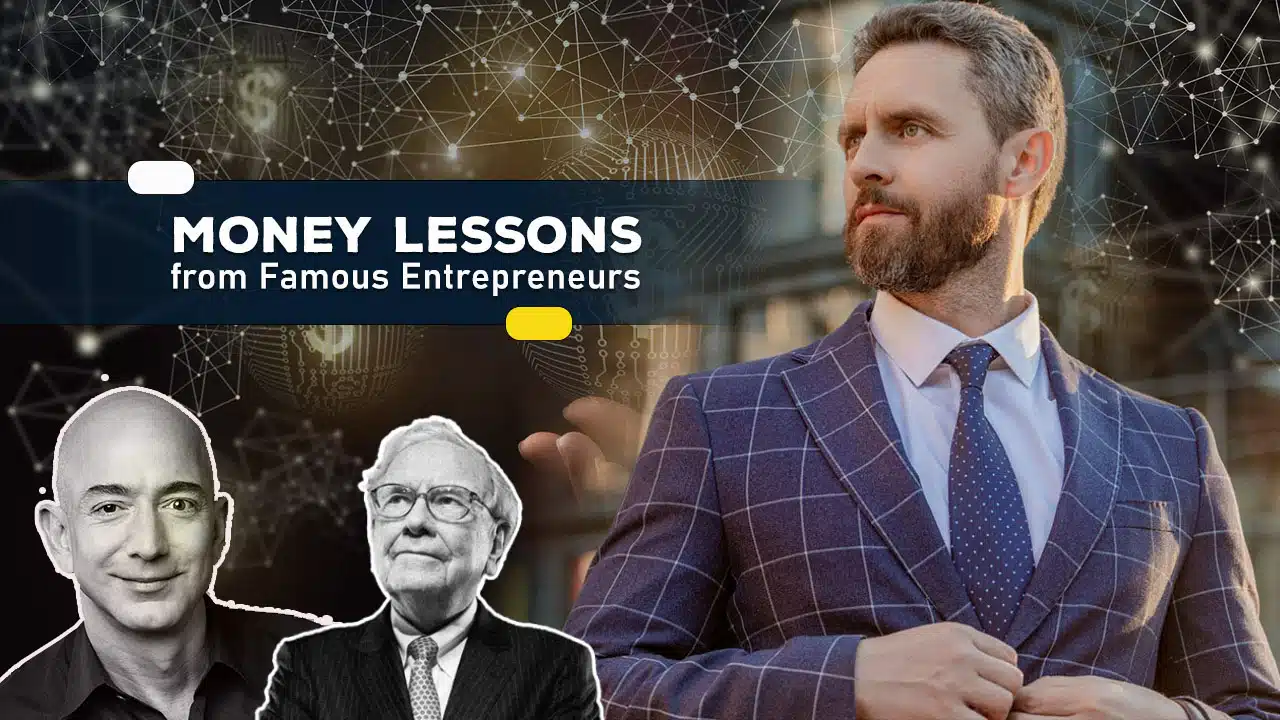The path to financial success is often paved with hard-earned lessons, and no one knows this better than some of the world’s most successful entrepreneurs.
From starting small businesses to building global empires, these individuals have learned valuable lessons about money that helped them achieve their goals.
By learning from their experiences, you can adopt strategies that will help you manage your finances, grow your wealth, and navigate the challenges of entrepreneurship.
Below are 15 money lessons from famous entrepreneurs that can inspire you to improve your financial habits and mindset.
1. Invest in Yourself — Warren Buffett
Warren Buffett, one of the most successful investors in history, is a strong advocate of investing in yourself.
He emphasizes that improving your skills, knowledge, and abilities is the best investment you can make.
According to Buffett, no one can take away what you’ve learned, and the returns on self-investment are far greater than any financial gain.
Lesson:
- Continuous Learning:
Buffett has said that the best asset you can have is your own earning power.
Whether it’s learning new skills, taking courses, or reading books, investing in yourself increases your potential to earn and grow wealth.
- Stay Informed:
Buffett’s voracious reading habit—he reads hundreds of pages a day—keeps him informed and ahead of trends.
Staying updated on industry trends and economic developments can help you make better financial decisions.
Takeaway:
Investing in yourself—whether through education, health, or personal development—is crucial for long-term financial success.
The knowledge and skills you acquire will open up new opportunities and increase your earning potential.
2. Start Small, Think Big — Jeff Bezos
Jeff Bezos, the founder of Amazon, started his business in his garage, selling books online.
What began as a small e-commerce platform evolved into one of the largest companies in the world.
Bezos’ journey teaches the importance of starting small while maintaining a long-term vision for growth.
Lesson:
- Test Your Ideas:
Bezos didn’t aim to build a retail empire overnight. Instead, he tested his idea with books before expanding into other product categories.
By starting small, you can test ideas, manage risks, and scale over time.
- Long-Term Thinking:
Bezos often refers to his “Day 1” philosophy, which emphasizes maintaining a mindset of constant innovation and focusing on the long term rather than immediate profits.
Takeaway:
It’s okay to start small, as long as you keep your bigger goals in mind.
Building something incrementally allows you to learn from mistakes, refine your approach, and create a solid foundation for long-term growth.
3. Frugality Is Key — Ingvar Kamprad
Ingvar Kamprad, the founder of IKEA, is known for his frugality, even as one of the richest people in the world.
Kamprad built his business on the principles of cost efficiency and passed that philosophy on to his company’s operations.
Despite his wealth, he was known for driving an old car and flying economy class.
Lesson:
- Avoid Unnecessary Spending:
Kamprad’s frugality allowed him to reinvest in his business, ensuring that IKEA could grow sustainably without incurring unnecessary costs.
- Efficient Operations:
Kamprad’s focus on cost-saving led to innovations like flat-pack furniture, which reduced shipping costs and made IKEA products more affordable.
Takeaway:
Frugality isn’t about being cheap; it’s about being mindful of where your money goes.
Minimizing unnecessary expenses allows you to allocate more funds toward growing your business or making smart investments.
4. Fail Forward — Richard Branson
Richard Branson, founder of the Virgin Group, has had his fair share of business failures.
From Virgin Cola to Virgin Brides, not all of Branson’s ventures succeeded.
However, he learned valuable lessons from these failures, which he applied to his future successes.
Lesson:
- Embrace Failure:
Branson believes that failure is part of the journey to success.
Instead of fearing failure, entrepreneurs should see it as an opportunity to learn and improve.
- Don’t Be Afraid to Take Risks:
Branson is known for his adventurous spirit and willingness to take risks.
While not every risk pays off, the ones that do can lead to massive rewards.
Takeaway:
Failure is inevitable in business, but how you respond to it makes all the difference.
Learn from your mistakes, make adjustments, and keep moving forward. Every failure is an opportunity for growth.
5. Cash Flow Is King — Mark Cuban
Billionaire entrepreneur Mark Cuban emphasizes the importance of maintaining a healthy cash flow.
Cuban has often said that cash flow is more important than profit, especially in the early stages of a business.
Without adequate cash flow, even profitable companies can fail due to the inability to cover short-term expenses.
Lesson:
- Manage Cash Flow Carefully:
Cuban believes that having cash on hand gives businesses flexibility and resilience.
He advises keeping a close eye on cash flow to ensure you can cover operating expenses, payroll, and unexpected costs.
- Debt Awareness:
Cuban is cautious about taking on debt and advises entrepreneurs to minimize debt whenever possible.
In his early days, he avoided loans and relied on his business’s cash flow to fuel growth.
Takeaway:
Maintaining healthy cash flow is crucial for long-term sustainability.
Prioritize managing your cash flow and avoid unnecessary debt to ensure that your business can weather tough times.
6. Reinvest in Your Business — Elon Musk
Elon Musk, the founder of Tesla and SpaceX, is known for reinvesting heavily in his businesses.
Rather than focusing on short-term gains, Musk consistently puts his profits back into his ventures to fund research, development, and innovation.
His willingness to reinvest has helped him create industry-leading companies.
Lesson:
- Prioritize Long-Term Growth:
Musk’s approach to reinvesting profits into his businesses rather than pocketing them for personal gain has led to long-term growth and innovation.
- Be Willing to Make Sacrifices:
Musk’s dedication to his businesses meant making personal sacrifices.
At one point, he invested almost all his money into Tesla and SpaceX, taking significant personal risks.
Takeaway:
Reinvesting in your business, especially in the early stages, can fuel growth and innovation.
While it may require short-term sacrifices, the long-term payoff can be substantial.
7. Create Multiple Streams of Income — Oprah Winfrey
Oprah Winfrey, media mogul and entrepreneur, built her empire by diversifying her income streams.
From her talk show and media company to book deals, investments, and philanthropic ventures, Oprah has created a vast array of revenue-generating opportunities.
Lesson:
- Diversify Your Income:
Oprah’s success shows the power of diversification.
By not relying on just one source of income, you reduce risk and open up new opportunities for growth.
- Leverage Your Brand:
Oprah has masterfully used her personal brand to create multiple business ventures, all of which align with her core values and message.
Building a strong brand allows you to branch out into different industries.
Takeaway:
Don’t rely on just one source of income.
Explore ways to diversify, whether through investments, side businesses, or passive income streams, to create financial security and growth opportunities.
8. Build a Great Team — Steve Jobs
Steve Jobs, co-founder of Apple, understood the importance of building a strong team.
He believed that the people you surround yourself with can make or break your business.
Jobs was known for hiring top talent and fostering a culture of creativity and innovation at Apple.
Lesson:
- Hire the Best:
Jobs often said that hiring A-players—people who are highly skilled, motivated, and passionate—was essential to Apple’s success.
- Empower Your Team:
Jobs believed in giving his team the freedom to innovate.
By empowering his employees to take ownership of their projects, he fostered a culture of excellence and creativity.
Takeaway:
The people you work with are critical to your success.
Invest in hiring the right team members, and create an environment that encourages collaboration and innovation.
9. Know Your Market — Sara Blakely
Sara Blakely, the founder of Spanx, built her billion-dollar company by identifying a gap in the market.
Blakely recognized that women needed more comfortable and effective shapewear, and she capitalized on this opportunity to create a product that resonated with millions of women.
Lesson:
- Understand Consumer Needs:
Blakely’s success came from understanding her target market’s pain points and creating a product that solved those problems.
- Innovate Within Your Market:
Rather than entering a crowded market, Blakely found a niche and innovated.
Her product was unique, giving her a competitive edge.
Takeaway:
To succeed in business, you must thoroughly understand your market and customer needs.
Identify gaps and opportunities, then innovate to create products or services that meet those needs.
10. Focus on Value, Not Price — Howard Schultz
Howard Schultz, the former CEO of Starbucks, revolutionized the coffee industry by focusing on delivering value rather than competing on price.
Schultz understood that customers would be willing to pay more for an experience that offered convenience, quality, and a comfortable environment.
Lesson:
- Create an Experience:
Schultz didn’t just sell coffee; he sold the Starbucks experience.
By focusing on value and customer experience, he was able to justify premium pricing.
- Quality Over Quantity:
Schultz believes that businesses should prioritize quality over volume.
By focusing on delivering a superior product and service, you can create loyal customers who are willing to pay more.
Takeaway:
Don’t compete on price alone. Focus on delivering value, whether through the quality of your product or the overall customer experience, and you can build a more loyal and profitable customer base.
11. Keep a Financial Safety Net — Jack Ma
Jack Ma, the founder of Alibaba, knows the importance of having a financial safety net.
Despite being a billionaire, Ma advises entrepreneurs to always have savings to fall back on.
His philosophy is rooted in his early experiences of failure and the unpredictability of business.
Lesson:
- Save for a Rainy Day:
Ma emphasizes that no matter how successful you are, you should always have a financial safety net.
This gives you the freedom to take risks while knowing you have a buffer for tough times.
- Avoid Overleveraging:
Ma is cautious about taking on too much debt, particularly in the early stages of a business.
A safety net helps you avoid overextending yourself financially.
Takeaway:
Always have savings or a financial cushion to fall back on.
This allows you to take risks, make bold decisions, and weather unforeseen financial challenges.
12. Adapt to Change — Bill Gates
Bill Gates, the co-founder of Microsoft, built his empire by staying ahead of technological trends and adapting to change.
Gates knew that to stay relevant in the fast-paced tech industry, his company would need to constantly innovate and embrace new developments.
Lesson:
- Embrace Innovation:
Gates was never afraid to innovate and pivot when necessary.
Staying ahead of the curve and being open to new ideas and technologies was key to Microsoft’s continued success.
- Prepare for the Future:
Gates is a strong advocate for planning for the future.
Whether it’s anticipating market shifts or preparing for global challenges (like pandemics), Gates believes in being proactive rather than reactive.
Takeaway:
To succeed in business, you must be willing to adapt to change.
Stay informed about industry trends and be open to innovation, as it will keep your business competitive and relevant.
13. Leverage Technology — Larry Page
Larry Page, co-founder of Google, has always been a proponent of using technology to create efficiency and scale.
Google’s success is largely due to its ability to leverage technology to solve problems and streamline processes, making the company one of the most efficient and scalable in the world.
Lesson:
- Invest in Technology:
Page believes that technology can be a powerful tool for businesses, helping them scale, improve efficiency, and reduce costs.
- Automate Where Possible:
Automating routine tasks frees up time and resources, allowing you to focus on more strategic aspects of your business.
Takeaway:
Leverage technology to improve efficiency, reduce costs, and scale your business.
Whether it’s through automation, software tools, or digital marketing, technology can help you grow faster and more effectively.
14. Be Patient with Growth — Steve Ballmer
Steve Ballmer, the former CEO of Microsoft, knows the importance of patience when it comes to business growth.
He has often spoken about the importance of long-term thinking, particularly in an industry that moves as quickly as tech.
Ballmer encourages entrepreneurs to focus on sustainable growth rather than chasing quick wins.
Lesson:
- Think Long Term:
Ballmer emphasizes that success doesn’t happen overnight.
Instead, focus on building a solid foundation for your business, even if growth is slow at first.
- Avoid Short-Term Temptations:
Ballmer advises against making short-sighted decisions for quick profits.
Instead, prioritize decisions that will lead to long-term success, even if they take longer to materialize.
Takeaway:
Be patient when building your business. Sustainable, long-term growth is more valuable than chasing quick wins that may not last.
Stay focused on your long-term goals and build a business that can withstand the test of time.
15. Give Back — Bill Gates and Oprah Winfrey
Both Bill Gates and Oprah Winfrey have become known not only for their business success but also for their philanthropic efforts.
Both entrepreneurs emphasize the importance of giving back, whether through charitable donations, foundations, or using their influence for good.
Lesson:
- Share Your Success:
Gates and Winfrey have shown that success isn’t just about accumulating wealth; it’s also about giving back to the community and making a positive impact on the world.
- Philanthropy as a Legacy:
Both entrepreneurs view philanthropy as a way to leave a lasting legacy.
By giving back, they contribute to causes they care about and help improve the lives of others.
Takeaway:
True success isn’t just about financial wealth—it’s also about using that wealth to make a difference in the world.
Whether it’s through philanthropy, mentoring, or community service, giving back is a meaningful way to share your success with others.
Final Thoughts
The journey to financial success is filled with valuable lessons, and these 15 money lessons from famous entrepreneurs offer insights that can guide your own financial decisions.
From Warren Buffett’s advice to invest in yourself to Bill Gates’ emphasis on adaptability, these lessons provide a roadmap for building wealth, managing money wisely, and creating a sustainable business.
By applying these principles, you can improve your financial habits, grow your business, and achieve long-term success.
Remember, financial success doesn’t happen overnight. It requires a combination of hard work, smart decisions, and a willingness to learn from both successes and failures.
By adopting the money lessons from these renowned entrepreneurs, you’ll be better equipped to navigate the challenges of business and build a prosperous future.








































